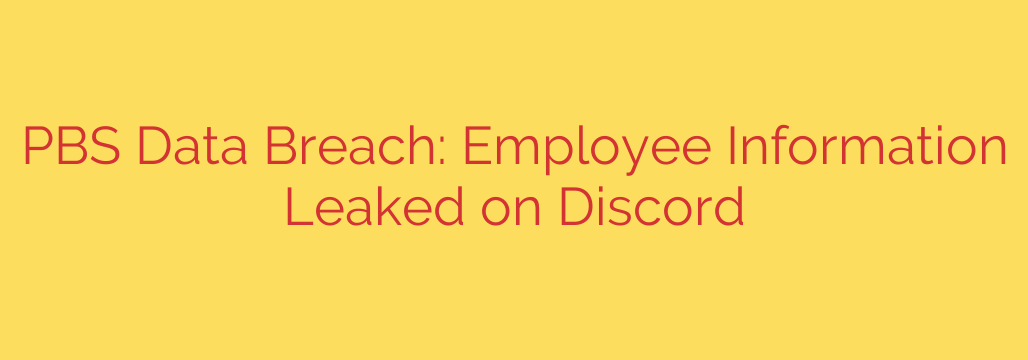
Major PBS Data Breach: Employee Information Leaked on Discord
A significant data security incident at the Public Broadcasting Service (PBS) has resulted in the exposure of sensitive employee and contractor information. The compromised data was discovered on a Discord server, highlighting a modern and increasingly common vector for data leaks that organizations must address.
This breach serves as a critical reminder that sensitive corporate information can surface in unexpected public forums, posing a serious risk to individuals and the organization itself.
What Happened? The Details of the Breach
The security incident involved a large dataset containing personally identifiable information (PII) belonging to hundreds of thousands of current and former PBS employees and station personnel. The data was reportedly exfiltrated from a misconfigured cloud server and later posted online.
What makes this incident particularly noteworthy is the platform used for dissemination. Instead of the dark web, the data was leaked directly onto a Discord server, a popular communication platform for gamers and online communities. This public exposure significantly increases the risk of the information being accessed and misused by a wide audience.
The Scope of the Data Exposure
The compromised database contained a wealth of sensitive personal and professional details. Individuals connected with PBS should be aware that the following types of information may have been exposed:
- Full names
- Mailing addresses and phone numbers
- Email addresses
- Dates of birth
- Social Security numbers (in some cases)
- Job titles and station affiliations
The inclusion of highly sensitive data like Social Security numbers elevates the severity of this breach, putting affected individuals at a direct risk of identity theft and financial fraud.
Actionable Security Steps for Affected Individuals
If you are a current or former PBS employee or contractor, it is crucial to take immediate steps to protect yourself. Even if you are unsure whether your data was included, practicing good digital hygiene is always a wise decision.
Monitor Your Financial Accounts and Credit Reports. Keep a close watch on your bank statements, credit card activity, and credit reports for any unusual or unauthorized transactions. Consider signing up for a credit monitoring service, some of which offer free plans.
Place a Fraud Alert or Credit Freeze. Contact one of the three major credit bureaus (Equifax, Experian, or TransUnion) to place a fraud alert on your file. For maximum protection, consider a credit freeze, which restricts access to your credit report and makes it much more difficult for criminals to open new accounts in your name.
Enable Two-Factor Authentication (2FA). Secure all of your important online accounts—especially email, banking, and social media—with 2FA. This security measure requires a second form of verification in addition to your password, providing a powerful barrier against unauthorized access.
Be Vigilant Against Phishing Scams. Cybercriminals often use leaked information from data breaches to create highly convincing phishing emails, text messages (smishing), or phone calls (vishing). Be suspicious of any unsolicited communication that asks for personal information, login credentials, or financial details. Never click on suspicious links or download attachments from unknown senders.
Broader Implications for Organizations
This incident underscores a critical lesson for all businesses: cybersecurity is not just about protecting against hackers breaking into your primary network. It’s also about managing your entire digital footprint, including:
- Cloud Security Configuration: Misconfigured cloud servers remain one of the most common causes of major data breaches. Organizations must implement rigorous controls and regular audits to ensure their cloud assets are secure.
- Third-Party Vendor Risk: Data is often shared with numerous partners and vendors. It’s essential to vet the security practices of all third parties who have access to your sensitive information.
- Monitoring Unconventional Platforms: Security teams must expand their threat intelligence efforts beyond the dark web to include public platforms like Discord, Telegram, and Pastebin, where stolen data is now frequently shared.
Ultimately, the PBS data breach is a stark reminder of the evolving threat landscape. For individuals, it reinforces the need for proactive self-protection, while for organizations, it highlights the non-negotiable importance of a comprehensive and multi-layered cybersecurity strategy.
Source: https://www.bleepingcomputer.com/news/security/pbs-confirms-data-breach-after-employee-info-leaked-on-discord-servers/








